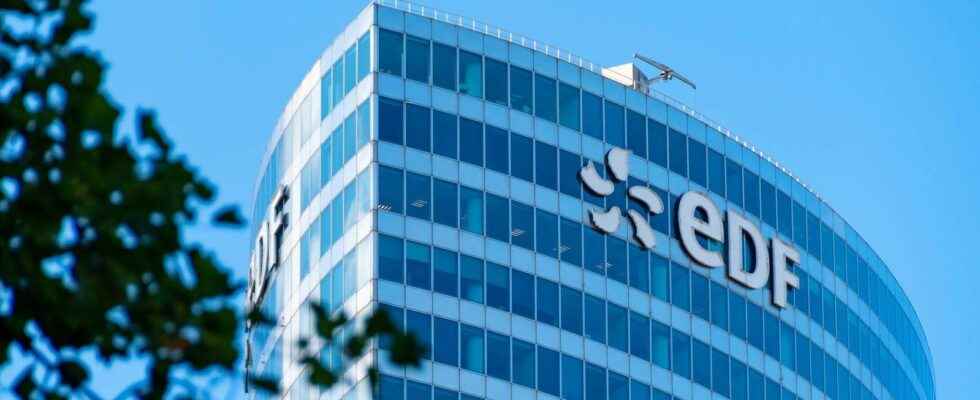(AOF) – Goldman Sachs Bank Europe SE and Société Générale, acting on behalf of the French State, have filed with the Autorité des marchés financiers (AMF) a draft simplified tender offer for EDF shares . The price of 12 euros per share has been confirmed. To date, the initiator of the offer holds 83.69% of the capital and 89.13% of the voting rights of the company. The offeror irrevocably undertakes to acquire all of the 803,469,846 EDF shares existing or likely to be issued that it does not hold directly or indirectly.
The State will thus pay around 9.7 billion euros to take up 100% of EDF.
AOF – LEARN MORE
Key points
– World leader in low-carbon energy created in 1946 with 38.5 million customers worldwide and 117.3 GW of installed capacity: 60% in nuclear, 18% in hydraulics, 8% in energies renewables, 9% in gas, 3% in fuel oil and 2% in coal;
– Turnover of €84.5 billion and installed capacity of 117.3 GW: 60% in nuclear, 18% in hydraulics, 8% in renewable energies, 9% in gas, 3% in fuel oil and 2% in coal;
– “Cap 30” business model with 3 strategic axes: supporting customers towards carbon neutrality via 10 billion in revenue in services, the rank of 1
er
global producer of net electricity in CO2 and the role of global player in the energy transition;
– Capital 83.88% owned by the State, Jean-Bernard Lévy being CEO of the 18-member board of directors;
– Balance sheet cleaned up in April with net debt (rated A due to the State guarantee) of €42.3 billion, which will be reinforced between 2022 and 2024 by the disposal plan of €3 billion.
Challenges
– 4 strategic plans: electric mobility – 30% market share in the supply of electricity to electric vehicles by 2023 in France, United Kingdom, Italy and Belgium-, storage -10 GW installed worldwide in 2035-, solar power – 30% of the market in France in 2035- and the Excell plan for the French nuclear industry;
– Innovation strategy dedicated to digital transformation, production processes, future electrical systems and the decarbonization of customer uses: R&D budget of €661 million with 756 patented innovations, EDF Pulse Croissance funds and incubator and research partnerships (Sinclair laboratory, 5g living Lab, quantum computing, etc.);
– Environmental strategy included in the group’s raison d’être: carbon neutrality in 2050 and 50% reduction, vs 2017 of emissions in 2030, 99% of operating budgets dedicated to decarbonization and energy transition, €8.755 billion in “green and sustainable” financing and 72% of credit lines indexed on ESG indicators;
– Launch of the construction program for 6 EPR2s and studies for 8 others;
– Maintenance of high wholesale prices partially offsetting the limitation by the State of the increase in prices to individuals on the operating profit;
– Integrated operator, from the design and manufacture of nuclear reactors, through Framatome, 75% owned, alongside Mitsubishi (19.5%) to distribution.
Challenges
– Activity framed by the NOME law (free competition between all market players and resale of a quarter of EDF’s nuclear electricity production to its competitors) and electricity prices administered in France, hence a maintenance cost network little included in the tariffs;
– Impact of the Russia-Ukraine conflict: commodity volatility 1
eras
supply tensions;
– Neutralization of the competitive advantage of nuclear power by the obligation to sell electricity to industrialists at the market price and closures or maintenance of nuclear power plants, penalizing for 2022 production;
– Speculation on a delisting by the State;
– 2023 objective of a debt leverage of less than 3;
– 2021 dividend of €0.58, with option of payment in shares for the 2022 and 2023 financial years.
Threat to the European energy system
The leading importer of German gas, Uniper posts 54% of the volumes it buys from Russia. Following the war in Ukraine, the group had to acquire the volumes it lacked on the spot market, the prices of which had exploded. In difficulty, he requested aid from the German state, which raises concerns for all European energy companies. Nevertheless the German RWE and the French Engie reacted by arguing that their situation was very different. RWE stressed that it was less dependent on Russian gas. As for Engie, it benefits from the diversification of its sources of supply, with an increase in the volumes of LNG delivered in France and contracts with Norway and Algeria. The group has also adapted its hedging strategy to strengthen its resilience.
